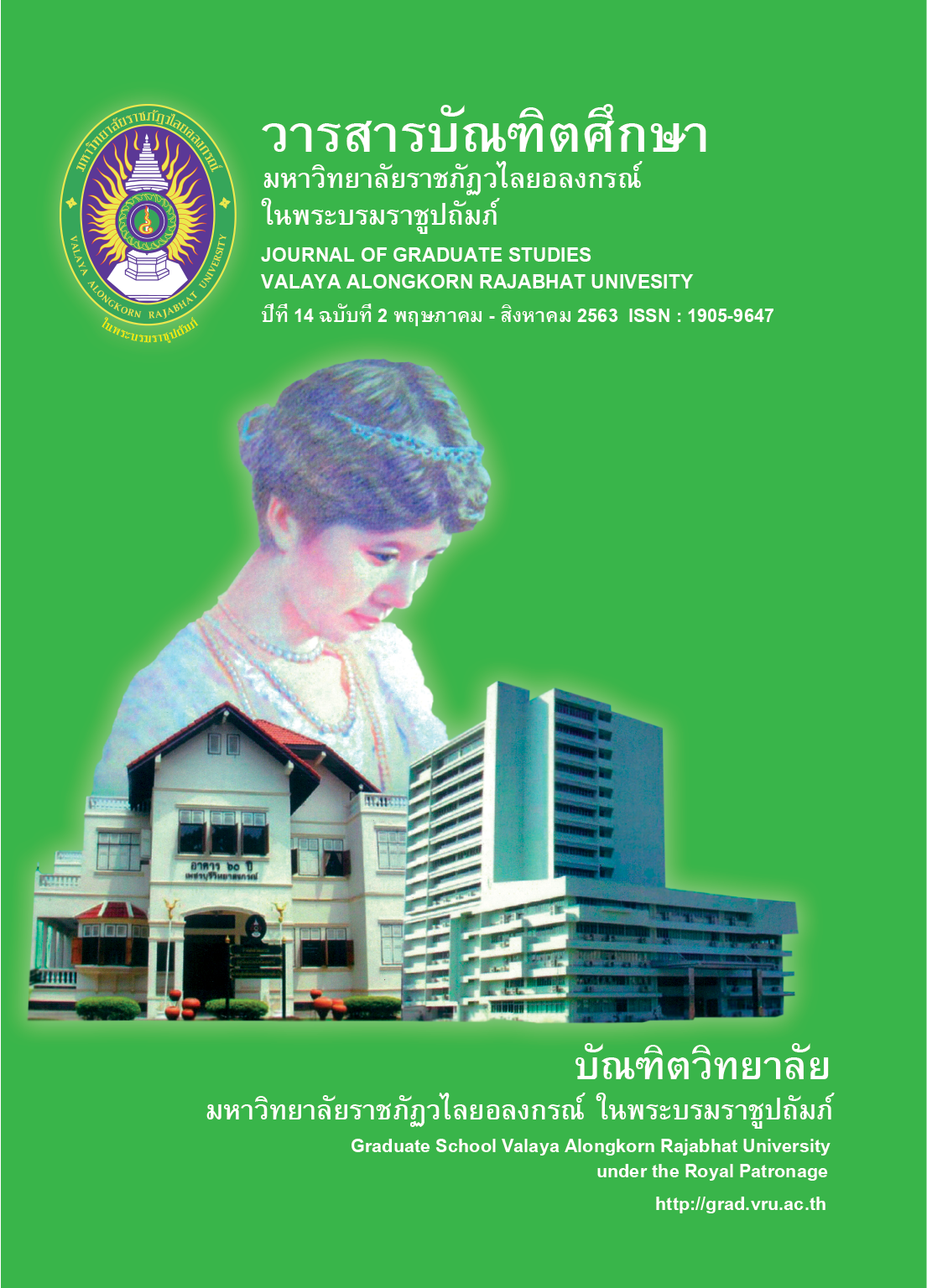THE DEVELOPMENT OF MATHAYOMSUKSA FOUR STUDENTS’ CRITICAL THINGKING SKILL ON COVALENT BOND BY INQUIRY – BASED LEARNING WITH HANDS - ON ACTIVITY
Main Article Content
Abstract
The purposes of this research were 1) to compare learning achievement of mathayomsuksa four students by inquiry – based learning with hands – on activity on Covalent bond, 2) to compare critical thinking skill of mathayomsuksa four students by inquiry – based learning with hands – on activity on Covalent bond, and 3) to study students’ satisfaction toward learning through inquiry – based learning with hands – on activity on Covalent bond. The sample was 41 mathayomsuksa four students studying in the first semester of the academic year 2019 at Mathayomprachaniwet secondary school in the service of Bangkok Metropolitan Administration, selected by purposive sampling. There were five sets of research instruments; inquiry - based learning lesson plan, learning achievement test, critical thinking skill test, satisfaction assessment and hands – on kit. The data were analyzed by using mean, percentage, standard deviation and t – test for dependent samples.
The results indicated that: 1) Students had higher learning achievement than before after learning through inquiry – based learning with hands – on activity on Covalent bond at the .05 level of confidence. 2) Students had higher critical thinking skill than before after learning through inquiry – based learning with hands – on activity on Covalent bond at the .05 level of confidence. And 3) Students’ satisfaction toward learning through inquiry – based learning with hands – on activity on Covalent bond as was at the highest level.
Article Details

This work is licensed under a Creative Commons Attribution-NonCommercial-NoDerivatives 4.0 International License.
บทความทุกเรื่องได้รับการตรวจความถูกต้องทางวิชาการโดยผู้ทรงคุณวุฒิ ทรรศนะและข้อคิดเห็นในบทความ Journal of Global of Perspectives in Humanities and Social Sciences (J-GPHSS) มิใช่เป็นทรรศนะและความคิดของผู้จัดทำจึงมิใช่ความรับผิดชอบของบัณฑิตวิทยาลัย มหาวิทยาลัยราชภัฏวไลยอลงกรณ์ ในพระบรมราชูปถัมภ์ กองบรรณาธิการไม่สงวนสิทธิ์การคัดลอก แต่ให้อ้างอิงแหล่งที่มา
References
Duangtanoi, S. (2009). kān khit yāng mī wičhāranayān læ phon samrit thāngkān rīan witthayāsāt rư̄ang watsadu læ sombat khō̜ng watsadu khō̜ng nakrīan chan prathomsưksā pī thī hā thī dai rap kānsō̜n bǣp sư̄pso̜ hākhwām rū [Critical Thinking and Learning Achievement in The Science Topic of “Material and Quality of Material” of Prathomsuksa V Students Using Inquiry Cycle Techniques (Inquiry Cycle)]. Master of education Thesis. Khonkaen University.
Eastwood, L. M. (2013). Fastest Fingers: A Molecule-Building Game for Teaching Organic Chemistry. Journal of Chemical Education. 90, 1038−1041.
Fakkao, S. (2017). thaksa nai satawat thī yīsipʻet [21st century skills]. Retrieved from http://web.chandra.ac.th/.
Jeenjankit, U. (2012). kānphatthanā sūn bō̜rikān ʻō̜nlai dān kānčhatkān rīan kānsō̜n wichā khēmī dūai withī sư̄pso̜ hākhwām rū [Development an Online-Service Center of Chemistry Teaching and Learning by Scientific Inquiry 4]. Quality learning foundation.
Ministry of Education. (2016). phǣn phatthanā sētthakit khō̜ng krasūang sưksāthikān [Education development plan vol.12]. Bangkok.
National Institute of Educational Testing Service. (2017). khanǣn ʻōnet [O-net score]. Retrieved from http:// www.niets.or.th.
Sodesiri, N. (2015). phon khō̜ng kānchai bǣp fưk sœ̄m thaksa rư̄ang phanthakhēmī dōi kānčhatkān rīanrū bǣp sư̄pso̜ hākhwām rū samrap nakrīan chan matthayommasưksā pī thī sī [Effects of Using Supplementary Exercises on Chemistry Bond Via Inquiry Learning Actities for Mathayomsuksa IV Students]. Master of education Thesis. Burirum Rajaphat University.
The Institute for the Promotion of Teaching Science and Technology. (2003). kānčhat sāra kān rīanrū klum witthayāsāt laksūt kānsưksā naphư̄n thān [The Basic Education Core Curriculum (Science)]. Bangkok.


